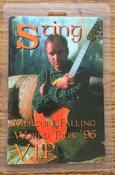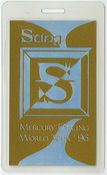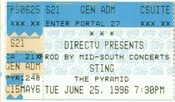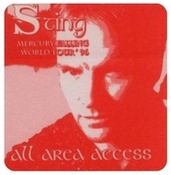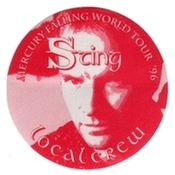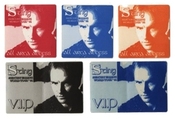
Mercury Falling
Jun
25
1996
Memphis, TN, US
The Pyramidwith Natalie Merchant
Crowd welcomes Sting: Tunes horning in on Memphis...
At The Pyramid Tuesday night, Sting went from walking on the moon to walking in Memphis.
Playing to an enthusiastic crowd of 8,638, Sting covered nearly 20 years of tunes in what amounted to a career retrospective.
Wearing leather biker pants and a cardigan vest, he found a happy balance between old and new. Several songs from his Police days got a good dusting off, including 'Roxanne' which, thanks to a Don Drummond-modeled trombone solo, was more ska than The Police ever were.
Newer material, especially songs off the recent 'Mercury Falling', were every bit as memorable. On 'I Hung My Head' and 'You Still Touch Me', the Stax influence that has always been inside Sting fully came out. Even 'If You Love Somebody Set Them Free' benefited from the added horn charts, played amiably by saxophonist Butch Thomas and Clark Gayton. And, yes, the Memphis Horns, featured on 'Mercury Falling', came onstage for the encore 'Lithium Sunset'. Who would guess it would be Sting to remind Memphis of our great soul heritage?
Sting's band - guitarist Dominic Miller, keyboardist Kenny Kirkland and drummer Vinnie Colaiuta - were the consummate backup players, able to move from urban funk to jazz to reggae with ease.
Sting himself was in glotal glory. No matter how sophisticated Sting's chord changes got, his melodies went down like folk medicine. Who else could turn Carl Jung into a ''Yeah eeh ohh'' singalong on 'Synchronicity II' and make it sound so profound?
Opener Natalie Merchant, formerly of 10,000 Maniacs, also found the profound in pop, focusing on songs from last year's debut solo album, 'Tigerlily'. Merchant, whose husky voice could cross over into cabaret, never once stopped swaying her hips in girlish abandon. When she stretched her arms, it was as if a swan had emerged. Like Sting, Merchant began as a ska enthusiast.
Her first records with 10,000 Maniacs in the early '80s took New Wave into the realm of reggae not unlike The Police. And like Sting, Merchant's mature style can be considered more balladic and introspective with an emphasis on mood and detail. Songs from 'Tigerlily' such as Carnival were catchy enough, though the actual carnival came in a trombone-and-congas calypso rendering of the 10,000 Maniacs hit 'These Are Days'. A tepid version of the pub rock classic ('What's So Funny 'Bout) Peace, Love and Understanding', with nary a hint of the original's urgency, pointed to the downside of her VH-1 approach.
(c) The Commercial Appeal by Bill Ellis
At The Pyramid Tuesday night, Sting went from walking on the moon to walking in Memphis.
Playing to an enthusiastic crowd of 8,638, Sting covered nearly 20 years of tunes in what amounted to a career retrospective.
Wearing leather biker pants and a cardigan vest, he found a happy balance between old and new. Several songs from his Police days got a good dusting off, including 'Roxanne' which, thanks to a Don Drummond-modeled trombone solo, was more ska than The Police ever were.
Newer material, especially songs off the recent 'Mercury Falling', were every bit as memorable. On 'I Hung My Head' and 'You Still Touch Me', the Stax influence that has always been inside Sting fully came out. Even 'If You Love Somebody Set Them Free' benefited from the added horn charts, played amiably by saxophonist Butch Thomas and Clark Gayton. And, yes, the Memphis Horns, featured on 'Mercury Falling', came onstage for the encore 'Lithium Sunset'. Who would guess it would be Sting to remind Memphis of our great soul heritage?
Sting's band - guitarist Dominic Miller, keyboardist Kenny Kirkland and drummer Vinnie Colaiuta - were the consummate backup players, able to move from urban funk to jazz to reggae with ease.
Sting himself was in glotal glory. No matter how sophisticated Sting's chord changes got, his melodies went down like folk medicine. Who else could turn Carl Jung into a ''Yeah eeh ohh'' singalong on 'Synchronicity II' and make it sound so profound?
Opener Natalie Merchant, formerly of 10,000 Maniacs, also found the profound in pop, focusing on songs from last year's debut solo album, 'Tigerlily'. Merchant, whose husky voice could cross over into cabaret, never once stopped swaying her hips in girlish abandon. When she stretched her arms, it was as if a swan had emerged. Like Sting, Merchant began as a ska enthusiast.
Her first records with 10,000 Maniacs in the early '80s took New Wave into the realm of reggae not unlike The Police. And like Sting, Merchant's mature style can be considered more balladic and introspective with an emphasis on mood and detail. Songs from 'Tigerlily' such as Carnival were catchy enough, though the actual carnival came in a trombone-and-congas calypso rendering of the 10,000 Maniacs hit 'These Are Days'. A tepid version of the pub rock classic ('What's So Funny 'Bout) Peace, Love and Understanding', with nary a hint of the original's urgency, pointed to the downside of her VH-1 approach.
(c) The Commercial Appeal by Bill Ellis

